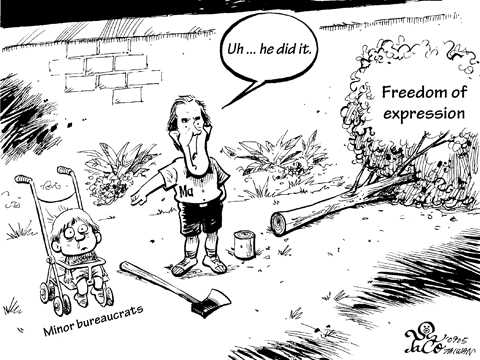
Living in
the past over our status
By Lin Cho-shui 林濁水
Sunday, May 17, 2009, Page 8
‘Domestic bickering over [Taiwan’s undetermined] status has become a political
show for the galleries and has nothing to do with resolving Taiwan’s
international dilemma.’
Taiwan has become a place of conflict between proponents of unification and
independence. At regular intervals, there must be a fight over Taiwan’s
undetermined status.
Leaving Taiwan’s status undetermined was a strategy arranged by the US after the
Korean War that bequeathed Taiwan a position in international law that would
prevent Chinese annexation as Taiwanese attempted to resolve the question of
sovereignty.
In recent years, however, domestic bickering over this status has become a
political show for the galleries and has nothing to do with resolving Taiwan’s
international dilemma.
A typical example of this is former president Chen Shui-bian (陳水扁). He should
have been the most likely person to support the “undetermined status” discourse
because it denies the existence of the Republic of China (ROC). Instead, he
rejected it in 2004 for fear that it would threaten the legitimacy of his
presidency.
Chen was quoted as saying that “We must be grateful and not forget our roots …
the connections between Taiwan and the ROC cannot be distorted … in particular,
those years when the ROC occupied the mainland before 1949 cannot be wiped
away.”
Arguing that Taiwan’s undetermined status has little to do with resolving
Taiwan’s sovereignty under international law does not mean the subject is passe
in the international community — a view advanced in 2004 by President Ma Ying-jeou
(馬英九) and more recently by other pro-unification individuals.
In fact, several countries with international influence have never given up the
position that Taiwan’s status is undetermined. Evidence of this can be found in
recent remarks by Japan’s representative to Taiwan, Masaki Saito, that Taiwan’s
status is “still unresolved.”
In another example that appeared not so long ago, the US government opposed UN
Secretary-General Ban Ki-moon when he interpreted UN Resolution 2758 as saying
that Taiwan is a part of the People’s Republic of China.
In addition, all the talk in the US about maintaining the “status quo” can only
be interpreted as support for the view that Taiwan’s status is undetermined.
When the US first brought up the concept, it was framed in terms of the
self-determination of the residents of Taiwan or a possible declaration of
independence by dictator Chiang Kai-shek (蔣介石). Maintaining undetermined status
was not the US’ first choice for Taiwan — it wanted either Taiwanese
independence or “two Chinas.”
After the ROC withdrew from the UN, Taiwan’s status remained unresolved, but the
concepts of “Taiwanese independence” and “two Chinas” were dismissed by most
major governments, denying Taiwan even the right to self-determination. The new
version of Taiwan’s undetermined status came to denote both anti-independence
and anti-unification.
If this were the case, it would be absurd for pro-unification and
pro-independence fundamentalists to display anger or rejoice over Saito’s
remarks.
To supporters of unification, accepting that Taiwan’s status is undetermined
means not recognizing the ROC. Nowadays, however, these people do not even get
irritated when Ma backs away from the position of “one China, with each side
having its own interpretation” when addressing the international community or at
cross-strait events — or even when he advocates the concept of “no unification
and no independence.”
Thus, they have no reason to be angry with Saito’s remarks: The new version of
Taiwan’s undetermined status no longer has a connotation of independence.
Supporters of independence, while affirming the “no unification” element, should
be upset by the implications of “no independence” and the rejection of
referendums that would resolve the sovereignty issue. So why have they been
praising Saito?
The discourse of Taiwan’s undetermined status has changed greatly, but
pro-unification and pro-independence fundamentalists are living in the past. For
them, time has stopped. They refer to 60-year-old international treaties in
defending their positions. The independence side invokes the San Francisco Peace
Treaty, while the unification side relies on the Sino-Japanese Peace Treaty. But
these discourses are pointless.
Worse, these two treaties, as well as the Cairo Declaration, are residue of the
power struggles of past superpowers. They deal with problems between the Chinese
Nationalist Party (KMT) and the Chinese Communist Party — both oppressors in the
eyes of Taiwanese.
The treaties treat Taiwanese as property rather than masters of their territory.
At that time, the Taiwanese interest in striving for democracy and
self-determination was not strong enough, so they had to helplessly accept the
superpowers’ view of their status.
Today, however, Taiwan is a democracy. Yet pro-unification and pro-independence
fundamentalists are failing to maintain that the Taiwanese have the right to
self-determination.
Instead, they worship treaties that were drawn up by the superpowers of
yesteryear and that have nothing more than historical meaning today. It is truly
pathetic.
Lin Cho-shui is a former Democratic
Progressive Party legislator.